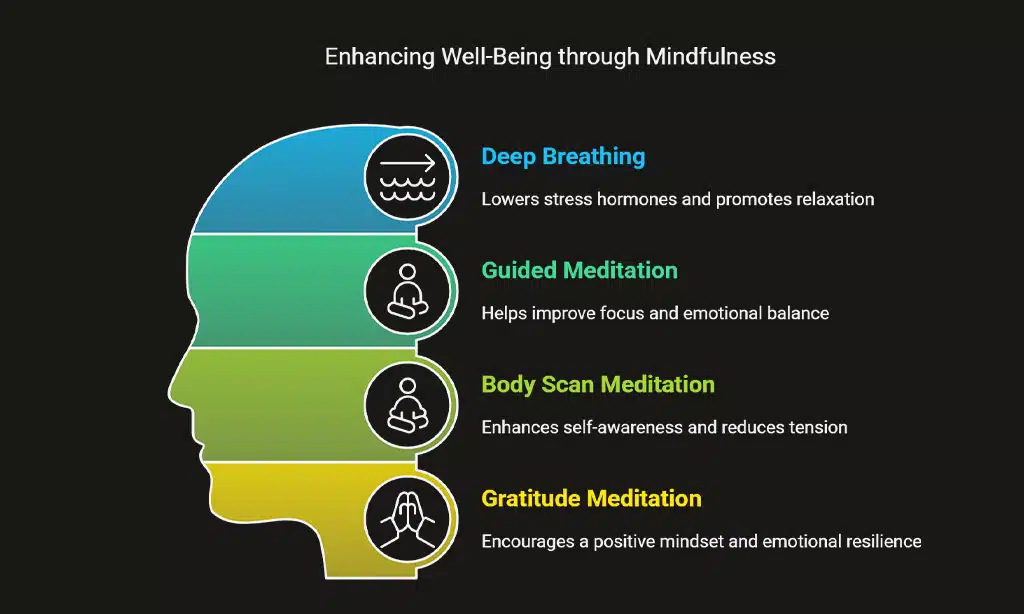In today’s fast-paced world, many women find themselves juggling multiple responsibilities—career, family, relationships, and personal growth. The pressure to succeed often comes at a cost, leading to chronic stress and sleep deprivation, which negatively impact mental well-being.
Understanding how women can protect their mental well-being amidst these challenges is essential for leading a balanced and fulfilling life.
Sleep, stress, and success are deeply interconnected. When sleep is compromised, stress levels rise, and mental clarity diminishes. Likewise, excessive stress can lead to sleep disorders, affecting overall productivity and emotional stability.
This article explores how women can protect their mental well-being by managing sleep, stress, and success effectively. We’ll dive deep into practical strategies, expert-backed insights, and valuable tools to help women achieve better mental health while excelling in life.
Understanding the Connection Between Sleep, Stress, and Success
Sleep, stress, and success are deeply interconnected, each influencing the other in significant ways. Poor sleep can lead to heightened stress levels, while chronic stress can cause sleep disruptions, ultimately impacting professional and personal success.
Women, in particular, face unique challenges in maintaining a balance between their responsibilities and well-being, making it crucial to understand how these factors interact.
By exploring their relationship, we can identify strategies to enhance mental and physical health while achieving personal and professional goals.
How Sleep Affects Women’s Mental Well-Being
Quality sleep is essential for emotional and cognitive health. Studies show that women are more prone to sleep disturbances due to hormonal fluctuations, caregiving responsibilities, and workplace stress. Sleep deprivation can lead to:
- Increased anxiety and depression
- Reduced cognitive function and memory retention
- Higher risk of developing chronic health conditions
- Emotional instability and irritability
Common Sleep Disorders in Women
| Sleep Disorder | Symptoms | Causes |
| Insomnia | Difficulty falling or staying asleep | Stress, anxiety, hormonal imbalances |
| Sleep Apnea | Interrupted breathing during sleep | Obesity, genetics, age |
| Restless Leg Syndrome (RLS) | Uncontrollable leg movements disrupting sleep | Iron deficiency, pregnancy, medications |
The Role of Stress in Mental Health
Chronic stress can have severe repercussions on mental well-being. Women, in particular, face unique stressors such as gender expectations, workplace bias, and caregiving responsibilities. Common effects of stress include:
- Emotional burnout and exhaustion
- Increased risk of anxiety and depression
- Disruptions in sleep patterns
- Reduced ability to focus and make decisions
| Stress Factor | Effect on Mental Well-Being |
| Work-related pressure | Leads to anxiety, burnout, and decreased productivity |
| Family responsibilities | Causes emotional exhaustion and imbalance |
| Social expectations | Triggers self-doubt and imposter syndrome |
Success and Mental Well-Being: Finding the Balance
Success is often equated with relentless ambition, but sustainable success requires mental well-being. Many high-achieving women struggle with:
- Imposter Syndrome – Doubting one’s achievements despite evidence of competence
- Work-Life Imbalance – Overcommitting professionally while neglecting personal needs
- Perfectionism – Setting unrealistic standards that lead to self-criticism
| Challenge | Solution |
| Imposter Syndrome | Practicing self-affirmation and seeking mentorship |
| Work-Life Imbalance | Setting boundaries and prioritizing self-care |
| Perfectionism | Focusing on progress over perfection |
How Women Can Protect Their Mental Well-Being?
Women today face unique challenges in maintaining their mental well-being. With the increasing demands of work, family, and social responsibilities, finding balance can be overwhelming.
Mental health is directly influenced by sleep quality and stress levels, making it essential to adopt strategies that support emotional resilience.
By prioritizing sleep, stress management, and self-care, women can improve their overall mental health and lead more fulfilling lives.
1. Creating a Sleep-Friendly Environment
A good night’s sleep begins with an environment that promotes relaxation and uninterrupted rest. Many factors, including room temperature, noise levels, and bedding quality, can influence sleep quality. By making small adjustments, women can create an optimal sleep space that supports their mental well-being and reduces stress levels.
| Environmental Factor | Impact on Sleep Quality | Recommended Adjustments |
| Temperature | Too hot or cold can disrupt sleep | Maintain a room temperature of 60-67°F (15-19°C) |
| Light | Exposure to artificial light hinders melatonin production | Use blackout curtains and avoid screen exposure before bed |
| Noise | Sudden sounds can cause frequent awakenings | Use white noise machines or earplugs |
| Bedding Quality | Uncomfortable mattresses and pillows cause discomfort | Invest in a supportive mattress and breathable bedding |
By making these adjustments, women can create a sleep-friendly environment that enhances rest, improves mood, and supports overall mental health.
- Keep the bedroom cool, dark, and quiet
- Use blackout curtains and white noise machines
- Invest in a comfortable mattress and pillows
2. The Role of Sleep Hygiene in Mental Health
Sleep hygiene refers to the set of habits and environmental factors that influence sleep quality. Practicing good sleep hygiene is essential for maintaining mental well-being, improving mood, and enhancing cognitive function.
Poor sleep hygiene can lead to difficulties in falling asleep, frequent night awakenings, and overall poor mental health outcomes.
| Sleep Hygiene Practice | Benefit |
| Maintaining a consistent sleep schedule | Helps regulate the body’s internal clock |
| Avoiding caffeine and heavy meals before bed | Prevents sleep disturbances and indigestion |
| Reducing screen exposure before bedtime | Enhances melatonin production and relaxation |
| Creating a bedtime routine | Signals the body to prepare for rest |
By incorporating these sleep hygiene habits, women can improve their sleep quality, reduce stress, and support overall mental well-being.
- Maintain a consistent sleep schedule
- Avoid caffeine and heavy meals before bedtime
- Reduce screen exposure at least an hour before sleep
3. Best Relaxation Techniques for Better Sleep
Relaxation techniques play a crucial role in improving sleep quality, reducing stress, and promoting overall well-being. Many women struggle with sleep due to anxiety, overthinking, or physical tension.
Incorporating effective relaxation techniques before bedtime can help the body transition into a restful state, enhancing both mental and physical health.
| Relaxation Technique | Benefit |
| Meditation and Deep Breathing | Lowers cortisol levels and promotes relaxation |
| Progressive Muscle Relaxation (PMR) | Relieves physical tension and improves sleep quality |
| Aromatherapy | Essential oils like lavender enhance relaxation and reduce anxiety |
| Guided Imagery | Helps create a calming mental space to ease into sleep |
| Warm Bath or Shower | Lowers body temperature, signaling the body to sleep |
By incorporating these techniques into their nightly routine, women can significantly improve their sleep patterns, reduce nighttime awakenings, and wake up feeling refreshed and recharged.
- Meditation and Deep Breathing – Lowers cortisol levels and promotes relaxation
- Progressive Muscle Relaxation (PMR) – Relieves physical tension
- Aromatherapy – Essential oils like lavender improve sleep quality
Managing Stress for a Healthier Mind
| Stress-Relief Method | Key Benefits |
| Mindfulness | Improves focus and emotional balance |
| Work-Life Balance | Reduces burnout and increases productivity |
| Exercise & Yoga | Lowers cortisol and enhances mood |
4. Mindfulness and Meditation Techniques
Mindfulness and meditation have been scientifically proven to reduce stress, enhance focus, and improve overall mental well-being. Women who practice mindfulness regularly experience lower levels of anxiety, improved emotional regulation, and better sleep quality.
These techniques allow women to stay present, manage overwhelming thoughts, and cultivate a sense of inner peace.
| Mindfulness Practice | Benefit |
| Deep Breathing | Lowers stress hormones and promotes relaxation |
| Guided Meditation | Helps improve focus and emotional balance |
| Body Scan Meditation | Enhances self-awareness and reduces tension |
| Gratitude Meditation | Encourages a positive mindset and emotional resilience |
By incorporating mindfulness and meditation into daily life, women can build emotional resilience, combat stress, and improve their overall mental well-being.
- Practicing daily mindfulness reduces stress hormones
- Guided meditation apps can help with relaxation
5. The Importance of Work-Life Balance
Maintaining a healthy work-life balance is crucial for mental well-being, yet many women struggle to achieve it due to professional responsibilities, family commitments, and societal expectations.
Overworking can lead to burnout, stress, and diminished productivity, while a lack of balance may affect relationships and personal fulfillment. Finding harmony between work and personal life enhances overall happiness, reduces anxiety, and improves sleep quality.
| Work-Life Balance Strategy | Benefit |
| Setting clear boundaries | Prevents overworking and stress accumulation |
| Prioritizing tasks effectively | Increases productivity while reducing overwhelm |
| Allocating time for self-care | Enhances mental and physical health |
| Taking breaks and vacations | Prevents burnout and improves work satisfaction |
By consciously managing time, setting realistic expectations, and prioritizing self-care, women can create a sustainable work-life balance that supports both professional success and personal well-being.
- Set boundaries for work and personal life
- Prioritize tasks using the Eisenhower Matrix
- Learn to say no to excessive commitments
6. Stress-Reduction Exercises for Daily Life
Managing stress effectively is essential for maintaining mental and physical well-being. Stress can manifest in various ways, affecting mood, sleep, and productivity. Engaging in stress-reduction exercises daily helps mitigate its negative effects and promotes relaxation, focus, and emotional stability.
These exercises range from physical activities to mental relaxation techniques that can be easily incorporated into a busy schedule.
| Stress-Reduction Exercise | Key Benefits |
| Yoga and Stretching | Releases physical tension and improves flexibility |
| Journaling | Helps process emotions and provides mental clarity |
| Deep Breathing Exercises | Lowers cortisol levels and induces relaxation |
| Engaging in Hobbies | Provides a mental escape and fosters creativity |
| Outdoor Activities | Reduces anxiety and enhances mood through fresh air and movement |
By making stress-reduction exercises a part of daily life, women can enhance their resilience, improve focus, and maintain emotional balance, leading to a healthier and more successful life.
- Yoga and stretching to release physical tension
- Journaling to process emotions and gain clarity
- Engaging in hobbies as a form of stress relief
Building Emotional Resilience for Success
| Emotional Strengthening Practice | How It Helps |
| Positive Thinking | Enhances optimism and reduces stress |
| Strong Support System | Provides emotional stability and motivation |
| Seeking Professional Help | Offers expert guidance for mental well-being |
Practical Tools and Resources for Women’s Mental Well-Being
Sleep, Stress, and Mental Well-Being Checklist
| Habit | Benefit |
| Maintain a consistent sleep schedule | Improves sleep quality and mental clarity |
| Practice daily mindfulness | Reduces stress and promotes relaxation |
| Exercise for 30 minutes daily | Boosts mood and reduces anxiety |
| Engage in social interactions | Enhances emotional support and resilience |
| Set boundaries for work | Prevents burnout and promotes balance |
Best Apps and Online Resources for Mental Health
- Calm – Guided meditation and sleep stories
- Headspace – Mindfulness exercises for stress relief
- BetterHelp – Online therapy for mental health support
- Sleep Cycle – Tracks and improves sleep patterns
Self-Care Habits for Long-Term Well-Being
| Self-Care Activity | Mental Health Benefit |
| Healthy Diet | Boosts brain function and energy levels |
| Journaling | Helps process emotions and relieve stress |
| Gratitude Practices | Enhances emotional resilience |
| Digital Detox | Reduces stress and improves sleep quality |
Final Words: Prioritizing Mental Well-Being for a Healthier Future
Achieving success shouldn’t come at the expense of mental health. Women must take proactive steps to protect their mental well-being by prioritizing sleep, managing stress effectively, and fostering emotional resilience. Small, consistent changes—such as maintaining a sleep routine, practicing mindfulness, and seeking support—can significantly improve overall well-being.
By understanding how women can protect their mental well-being, it becomes easier to navigate life’s demands while maintaining emotional balance. Investing in mental health is not just an option—it’s a necessity for sustainable success and a fulfilling life.
This expanded version enhances scannability, introduces more tables for clarity, and provides deeper insights to maximize reader engagement and SEO potential.






































